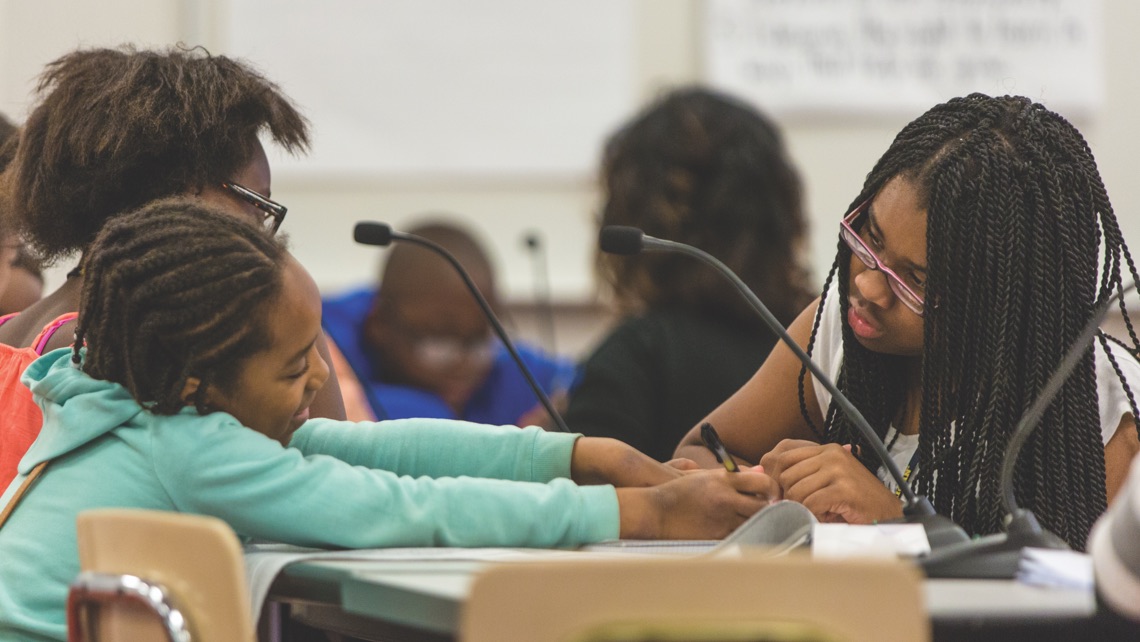TEACHING is powerful.
Research shows the quality of teaching that children receive has a significant impact on their growth. And in addition to children’s individual development, PUBLIC EDUCATION is foundational to the creation of a democratic and just society. Public education can uniquely afford young people opportunities to learn to understand, respect, and interact with others, to develop skills and knowledge necessary for individual flourishing and collective action, and to build an appreciation of and commitment to diversity. It has the potential to be a central force for justice and for disrupting legacies of oppression.
Yet despite these aspirations, public education has not achieved these aims for many groups of children in our country. Instead, it often creates injustice and reproduces inequity. Black children are suspended at three times the rate of white children, while they are assigned into special gifted and talented programs at two-thirds the rate of white children. Studies show that teachers’ subjective judgments of children are permeated by broader societal patterns of privilege and bias. Children of color and low-income children are more likely to be excluded from special opportunities and have dramatically less access to advanced courses and innovative curricula and programs. This is because they are less likely to have well-prepared and supported teachers. In fact, they are disproportionately taught by beginners. Every day in this country, thousands of children— especially Black, Latinx, and Native American—and children living in lowincome and marginalized communities miss out on educational opportunities because of their teachers’ unequal access to highquality preparation and support. White children also experience instruction and curriculum that omit the histories of oppression and privilege and often perpetuate inequities in our society. Few teachers enter the profession committed and knowing how to use teaching to disrupt racism and to develop a just society through what they do as they teach white children as well as children of color.
Skillful teaching is a complex practice that requires specialized knowledge, insight, and capability.
Teaching has the power to be a force for justice and for disrupting legacies of oppression.
Our country must commit to a professional standard for entry-level teaching. The learning, development, and growth of our nation’s young people cannot be left to chance. The active disruption of inequity cannot wait. Building the capacity and the will to develop teaching that advances justice is our imperative. More than 1.5 million new teachers will be hired over the next decade. Children, and our society, depend on these educators to be GREAT TEACHERS, teachers who are adequately prepared to teach skillfully, to strive actively to disrupt inequities, and to work toward the dream of public education. Achieving this depends on high-quality professional training that is comparable to other highstakes occupations.
We believe that GREAT TEACHERS AREN’T BORN; THEY’RE TAUGHT.
OUR MISSION is to create a system for teacher preparation and support that will make skillful beginning teaching that disrupts inequity commonplace. We know that establishing such a system with a professional standard for entry-level practice can only happen if we work collectively. Thus, we have partnered strategically with researchers, scholars, practitioners, policymakers, school districts, alternative and traditional teacher preparation programs, and teacher preparation centers from across the country. Through these various partnerships, we have supported efforts to identify and learn practices of teaching that are particularly “high-leverage” for beginning and early-career teachers. We have offered professional development, trainings, seminars, and consultations to support teacher educators in learning practice-based methods to prepare beginning teachers—methods that allow beginning teachers to engage in practice before they enter the classroom.
Through this collective work, we aim to contribute to achieving the vision of a just and equitable public education system, one that makes possible a better tomorrow for all children.



